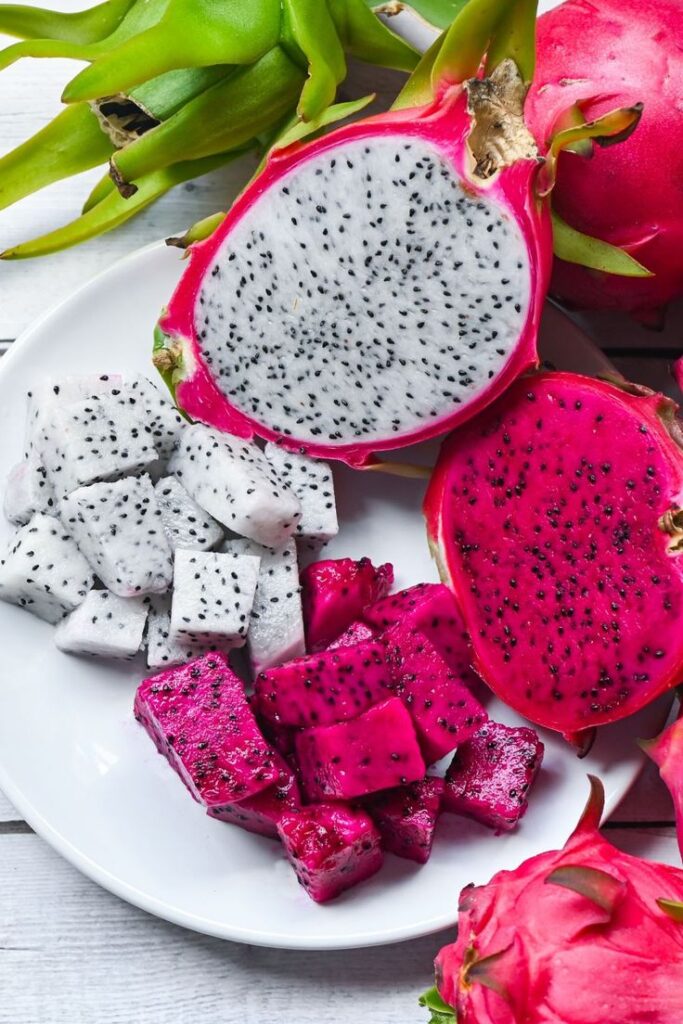Discover the vibrant world of dragon fruit, a nutrient-rich tropical delight known for its stunning appearance, health benefits.”

Table of Contents
What is Dragon Fruit?
This fruit, also known as pitaya, is a tropical fruit which is from the cactus family. It has vibrant pink or yellow skin with green scales and white or red flesh speckled with tiny black seeds. The fruit is known for its sweet, mildly tangy flavor and crunchy texture.
Nutritional Profile:
Here’s a breakdown of the nutritional profile of this fruit per 100 grams:
Macro-Nutrients:
| Macro-Nutrients | Value |
| Calories | 50-60 kcal |
| Carbohydrates | 11-13 g |
| Protein | 1-2 g |
| Fat | 0.1-0.6 g |
| Fiber | 3 g |
| Sugars | 8 g |
Vitamins:
| Vitamins | Value |
| Vitamin C | 3-9 mg |
| Vitamin B1 | 0.04 mg |
| Vitamin B2 | 0.05 mg |
| Vitamin B3 | 0.16 mg |
Minerals:
| Minerals | Value |
| Calcium | 6-10 mg |
| Iron | 0.3-0.7 mg |
| Magnesium | 10 mg |
| Phosphorus | 20 mg |
| Potassium | 110 mg |
Health Benefits of Dragon fruit:
This fruit offers several health benefits:
1) Boosts Immunity:
- It is rich in Vitamin C and the anti-oxidants present dragon fruit helps in strengthening immune system.
2) Helps in Digestion:
- It contains fiber which supports in healthy digestion and prevents constipation.
3) Promotes Heart Health:
- Contains flavonoids and healthy fats that help reduce cholesterol levels.
4) Supports Weight Management:
- Low in calories and high in fiber, helping you feel full longer.
5) Enhances Skin Health:
- Antioxidants and vitamin C promote healthy, glowing skin.
6) Regulates Blood Sugar:
- Fiber content helps to control blood sugar levels.
7) Improves Iron Levels:
- Provides iron, which is essential for energy and oxygen transport in the blood.
Incorporating dragon fruit into your diet can contribute to overall health and vitality.
Risks and Considerations:
Here are some risks and considerations of consuming this fruit:
1) Allergic Reactions:
- Rare, but some people may experience allergic reactions like swelling or hives.
2) Digestive Issues:
- Over consumption may lead to diarrhea due to high fiber content.
3) Interactions:
- People on specific medications should consult a doctor, as interactions are possible.
4) Natural Sugars:
- Contains natural sugars; those monitoring sugar intake should consume in moderation.
Enjoy in reasonable amounts to avoid digestive discomfort. Always consult with a healthcare provider if you have any concerns.
Facts:
Here are some interesting facts about dragon fruit:
1) Origin: Originated in Central America, now grown worldwide in tropical regions.
2) Cactus Family: Belongs to the cactus family, specifically the Hylocereus genus.
3) Varieties: Comes up with various colors like white, red, and yellow flesh.
4) Pollination: Flowers bloom at night and are pollinated by bats or moths.
5) Growth: Can grow on vines that reach up to 20 feet in length.
6) Hydration: Composed of about 90% water, making it very hydrating.
7) Culinary Uses: Eaten fresh, used in smoothies, desserts, and even cocktails.
8) Appearance: Known for its unique, vibrant look resembling a dragon’s scales.
Dragon fruit is not only nutritious but also fascinating in its growth and uses.
Myths:
Here are some common myths about dragon fruit:
1) Cures All Illnesses:
- While nutritious, it’s not a cure-all remedy.
2) Grows Only in Asia:
- Originally from Central America, it’s now cultivated globally.
3) Causes Weight Gain:
- Low in calories, it can be part of a healthy diet.
4) Always Red Inside:
- It can have white, red, or yellow flesh depending on the variety.
5) Difficult to Grow:
- With the right conditions, it’s relatively easy to cultivate.
6) Tastes Like a Dragon:
- Its flavor is actually mild, often compared to a mix of kiwi and pear.
Dragon fruit is nutritious, but it’s important to separate fact from fiction.
FAQ’s:
1) What are the benefits of dragon fruit?
- It is packed with high fibre that also aids in digestive health, and helps reduce the risk of cancer and cardiovascular diseases. Just like lentils, dragon fruit is prebiotic that, in turn, promotes probiotics such as gut-friendly bacteria – lactobacilli and bifidobacteria.
2) Can dragon fruit be eaten daily?
- For the most part, dragon fruit is safe to eat and offers many health benefits due to its vitamin C and antioxidant properties. The fruit is low in calories, making it a perfect everyday snack. However, some may be allergic to the fruit, with symptoms including swelling of the tongue, hives, and vomiting.
3) Is dragon fruit high in sugar?
- According to the USDA, 100 grams of dragon fruit contains 9.75 grams of total sugar. One whole dragon fruit contains 7.31 g of sugar, and one cup has the highest, about 17.6 g. Nonetheless, dragon fruit has a low GI. Therefore, its sugar does not significantly impact blood sugar when you eat dragon fruit in moderation.
Related articles:
https://taazafruithub.com/avocado-fruit-health-benefits-2024/
https://taazafruithub.com/health-benefits-of-boysenberry-fruit/
https://taazafruithub.com/best-health-benefits-of-coconut-fruit/
